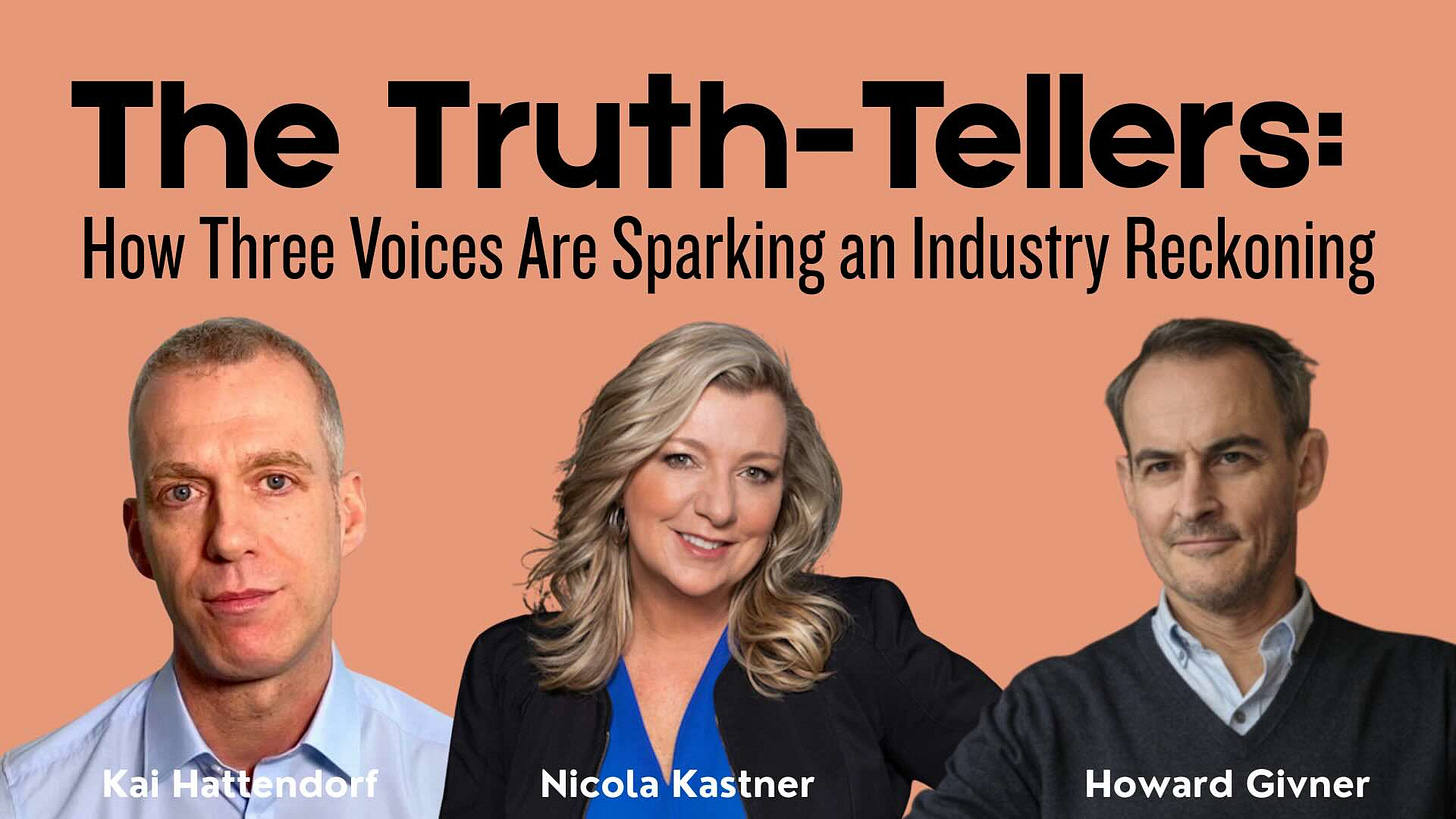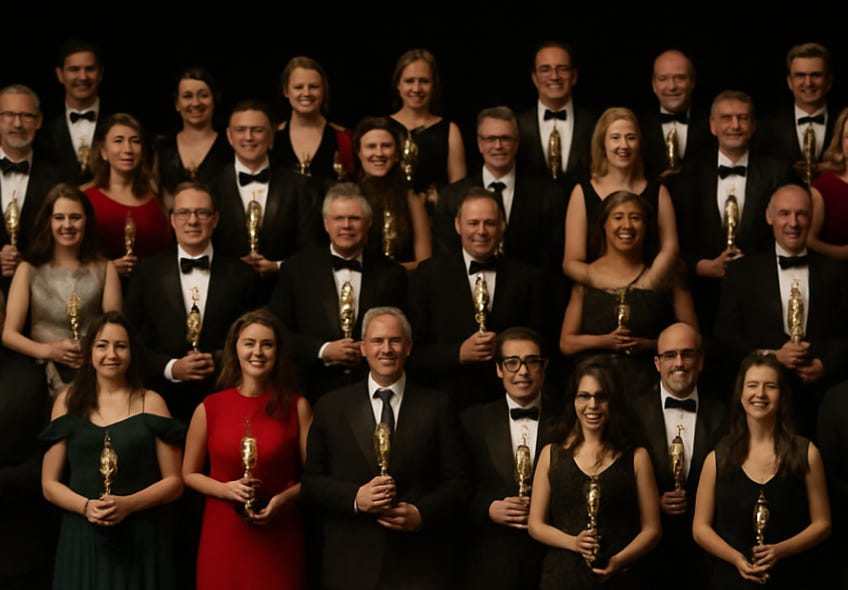The Power—and Peril—of Recognition
From the burnout behind the ballroom to the quiet rebellion of those who said “don’t vote for me,” the events world is having a reckoning—with recognition, integrity, and itself.
We have reached peak applause.
Every week, the feeds fill with another Top 50, Power 100, or Most Influential list. The intention is noble—celebrating excellence—but the effect is exhaustion. Recognition, once a sacred gesture, has become industrialized, manufactured, and mass-distributed like swag at a convention. It’s as if the Oscars handed out golden statues to everyone in the audience.
Picture it: fifty people on the same stage, each holding an identical trophy, smiling into the same lights. The first flashbulb feels electric, the second familiar, the third meaningless. The image is almost comic—the perfect metaphor for an industry so busy celebrating itself that it’s forgotten what celebration means.
No one understands this paradox better than we do. The event industry is built on recognition. We stage the galas, the summits, the ceremonies. We choreograph the standing ovations. We design the rituals that turn excellence into memory. We live to honor others. But somehow, we’ve lost the ability to honor ourselves truthfully.
Recognition is not a trivial thing. It’s neurological. When we’re seen, our brains flood with dopamine and serotonin—the chemicals of motivation and belonging. The ventral striatum lights up, the same region that glows for love, victory, and music. Recognition literally rewires us for connection. It tells the human animal: you matter. That’s why applause can feel euphoric, and its absence can sting like exile.
But the brain, like any system, has limits. Too much stimulus dulls the signal. When everyone is praised all the time, the dopamine fades and the meaning drains out. The applause becomes ambient noise. The emotional economy of recognition collapses under its own volume.

It’s direct, headline-ready, and perfectly complements the larger essay’s tone of cultural integrity and introspection.
And then came one post that cut through the noise.
In his Thoughts & Observations newsletter, Kai Hattendorf did something radical in its restraint. He announced that while he had been nominated—alongside roughly 1,500 others—for one of the Eventex Most Influential People in the Events Industry lists, he would not be campaigning.
“Yes, I have been nominated,” he wrote. “And NO, please do not vote for me.”
It was one sentence that landed like a gong.
Eventex, to its credit, has built an extraordinary machine. The platform now produces recognition lists across nearly every sub-sector—events, venues, suppliers, tech, weddings, and more. But it has also become something else: a recognition farm. A system of infinite self-nomination and open voting that rewards participation over principle. A place where being “most influential” depends as much on social media reach as on actual influence.
Kai’s quiet refusal to campaign was the opposite of cynicism—it was courage. He was not condemning Eventex; he was diagnosing the fatigue of an industry that can’t stop applauding itself.
Soon after, Nicola Kastner made the same decision. She, too, declined to campaign for her nomination. Her reasoning was pointed: if recognition requires campaigning, perhaps it’s not recognition at all.
And Howard Givner, through his Event Business Intelligence newsletter, put it into perspective. He examined “the good, the bad, and the ugly” of awards culture—how prestige has quietly morphed into a business model. Eventex was just the most visible example of a larger pattern: recognition as currency, applause as product.
For once, the event industry was having an adult conversation—not about branding, but about values.
I love that we’re pushing back, that a new generation of thinkers and journalists in our field is willing to name what others only whisper. The new class of event media—brave, unbought, unafraid—is fighting for honesty, for context, and for the legitimacy of this industry as a true cultural force. GatheringPoint.News is proud to be part of that chorus.
Because we should be questioning everything. Not to destroy, but to restore. Not to tear down, but to make the scaffolding stronger.
We need to get honest about how we work and how we treat one another. About the RFP process that turns creativity into a blood sport. About the hidden commissions between vendors and venues that erode trust. About the burnout that has quietly become endemic, with planners, producers, and suppliers pushed to the brink by the emotional labor of perfection. About the wellness crisis no one wants to name—the one that leaves so many exhausted, underpaid, under-credited, and permanently “on.”
We need to talk about the inefficiency and complacency of too many associations—still running 20th-century playbooks while claiming to represent a 21st-century industry. We need to talk about standards, fairness, transparency, mental health, diversity, equity, and the price of silence.
Because this isn’t just about awards. It’s about accountability. Recognition is the first mirror, but behind it are a dozen others: how we pay people, how we partner, how we measure value, how we define excellence, how we care for our own.
And here’s my confession: I’m part of this too. GatheringPoint.News will be publishing recognition lists of its own. The Top Public Companies in Events. The Top Independent Companies. The Boutique Venues List. The Event Entrepreneurs Index. The Top 100 Events in Major Markets. The Top 250 Events in the World. And, yes, a definitive Top Facilitators List. Because facilitation—the art of guiding people toward shared insight—is emerging as the most essential skill of modern convening.
But we’re going to do it differently. For us, these lists are not trophies—they’re maps. They exist to reveal the architecture of an industry too interconnected, too creative, and too important to be reduced to hashtags. We’re building recognition with rigor, transparency, and conscience. No pay-to-play. No algorithmic campaigns. No popularity contests. Just editorial honesty and contextual intelligence.
Because recognition, when done right, isn’t a prize. It’s a promise. It tells the world who we aspire to be.
The event industry should understand this better than anyone. We are the producers of moments that define value—whether at a corporate gala, a festival, or a global summit. But we cannot keep building those experiences for others while ignoring our own truth.
It wasn’t always like this. In Renaissance Florence, medals weren’t merchandise; they were memory. They immortalized scholars and artists as a statement of civic virtue. Later, in 1847, the Royal Norwegian Order of St. Olav made recognition sacred again: for distinguished service to Norway and mankind. Its white enamel, its lion, its motto—Ret og Sandhed—Justice and Truth—stood for something permanent. You couldn’t apply. You couldn’t campaign. You were simply seen.
That’s the essence we’ve lost—the courage to make recognition mean something again. The courage to be seen for the right reasons, not the loudest ones.
The Oscars still matter not because they’re perfect, but because they symbolize aspiration. They dramatize what it feels like to chase excellence, to fail publicly, to win in front of peers. When done well, those moments are not vanity—they’re cultural memory. The problem is not the ritual; it’s the rot underneath it when we forget why the ritual exists.
The event industry doesn’t need fewer awards. It needs truer ones. It needs honesty about wellness, fairness in economics, transparency in process, and bravery in storytelling. It needs leadership that stops spinning and starts speaking.
Maybe this is that turning point—a renaissance of recognition and reform. A moment when our industry decides that courage, clarity, and care are the new currencies.
If we can make recognition real again, we can make everything else real again too—the way we honor people, the way we partner, the way we design the very act of gathering. Because in the end, that’s what we’re all trying to do: to build spaces—literal and emotional—where people feel seen.
And perhaps that’s the greatest recognition of all.




Thank you for this content and thought leadership. This resonates with more than you know. I was one of the 1500 nominated but it's not me that needs the recognition it's the people, the human's who are silenced without any recognition, who go to work everyday feeling unappreciated, unrespected and are working in a culture of fear. I see behind the scenes while others cover it. I speak to the people who deserve to be seen.. These people are real humans with real emotions and would give anything and everything if they felt safe in their workplaces. We need to recognize how to prioritize people in our industry rather than the almighty buck. The majority of people in this industry are never recognized, or treated like human beings. They don't belong to any associations because they can't afford to and they don't believe that the leaders are doing anything that matters to them.
With all due respect to the association CEO's, leaders and decision makers, maybe its time to allow a younger generation to govern, who are more empathetic while understanding what matters to people rather than what matters to the CEO's, Presidents, Vice Presidents and so goes the chain of command. The day that happens we will be looking at a very different climate.
I hope I am alive to see that. All tat I can do is create curriculum that supports emotional intelligence and psychological safety that this industry has never taken seriously. I also don't do any of this for profit. I do it because it matters.